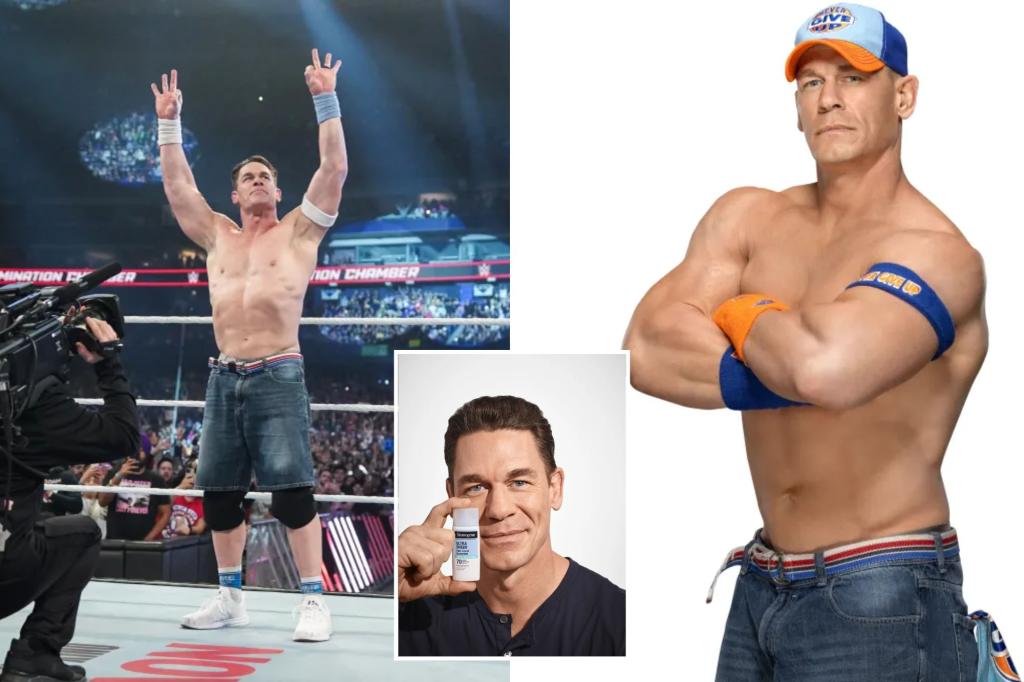John Cena dropped the bombshell news last week that he quietly overcame skin cancer, having previously had two cancerous spots removed from his pec and shoulder.
“Man, that phone call’s not what you want to get because it is unpredictable and you don’t know how bad it’s going to be,” Cena, 47, told People.
But the actor and WWE star admitted that he had long been “stubborn” about sun protection — and according to a dermatologist, he has that in common with a lot of men who tend to make two pretty big mistakes when it comes to cancer prevention.
No sunscreen? Big problem
Cena said he “never” wore sunscreen growing up, and that followed him into adulthood.
“I didn’t want to have a routine and I also thought the problem would never reach me. And it’s one of those things where I had a ton of exposure with minimal protection and it caught up with me,” he said.
It wasn’t until he went to see a dermatologist for a routine checkup that he got the wake-up call he needed.
“I’m at a great space in my life where that’s now important to me. And I’m so grateful to be able to dodge those two bullets, but I wear them as a reminder of, ‘Hey man, you need to take the extra few seconds to protect yourself every day,’” he said.
To that end, he recently teamed up with Neutrogena Ultra Sheer sunscreen for its latest campaign and hopes to encourage others to get serious about taking care of their skin.
Costly mistakes
It’s a message more men, in particular, may need to hear, since many tend to be less proactive about healthcare.
“Men tend to think less about regular preventive care because there’s not a lot of guideline-based preventive care for men compared to women,” Dr. Victor Quan, a dermatologist at Northwestern Medicine, told The Post.
Quan pointed out that while women may ask for a skin exam since they’re already at the doctor’s for other conditions like acne or rosacea, men will often avoid a visit until something is clearly wrong.
“In general, I see more women making appointments for regular preventive visits,” he said. “Men tend to come in when they or often, when their partner, notices a new or changing spot.”
Even then, they sometimes choose to simply ignore it — which could have serious consequences.
“Men sometimes do come in with skin cancers that are larger or more progressed,” he said, and “they don’t feel that bothered by a bump that would otherwise make someone else worried.
“Sometimes, they don’t know what skin cancers look like — that they don’t have to be ugly moles but can be warts, pimples, or scaly spots that are just not healing.”
Shockingly, he noted that some men “just haven’t been to any kind of a doctor” for 25 to 30 years.
A 2018 study published in JAMA Dermatology found the men had a 34% lower likelihood of visiting a dermatologist than women.
That being said, Quan did note that he’s been “seeing a recent trend of more men asking for skin checks purely on a preventive basis or even just asking for a ‘good skincare routine’” — a development he credits at least in part to social media.
But there’s another major blind spot that needs to be tackled — ignorance surrounding the significance of daily SPF.
“Men tend to know less about the importance of sun protection — such as that a base tan does not protect you from UV damage,” Quan said.
“Sun protection is so normalized for women, since so many cosmetic products now have SPF built in, whereas men are not using make-up, moisturizers or other products on a daily basis.”
That kind of thinking can have real consequences.
Research shows that men are more likely to develop skin cancer on areas like the scalp, face, and neck — areas that often go unprotected during outdoor activities, according to Dr. Neera Nathan, a dermatologist and skin cancer surgeon.
“My recommendation to all my patients, male or female, is to practice good sun protective behaviors, including seeking shade during peak sun hours, wearing broad-brimmed hats — remember, as we age, our hair thins, so our scalp becomes even more vulnerable to sun damage — sunglasses with UV protection, sun-protective clothing and wearing sunscreen on any exposed skin,” Nathan told The Post.
She recommends choosing a sunscreen that is water-resistant, contains SPF 30 or more and includes broad-spectrum UVA/UVB protection.
Most, importantly, “it is best to find a sunscreen you like — texture, feel, finish — because the best sunscreen is one you will actually wear,” she said.
Indeed, Cena told People that one of the reasons he loves the new Neutrogena Ultra Sheer line is because, following his diagnosis, he wanted “the highest SPF” sunscreen he could get his hands on, but “that stuff, it’s great for you, but it [leaves] a very white cast…like you’re wearing medicine.”
Getting sunscreen you’re going to actually use on a daily basis is critical because consistency is key — it could literally save your life.
“I give men the same advice that I give women, that sun exposure is the biggest modifiable risk factor for skin cancer,” Quan told The Post.
“I’m not asking them to stop all their outdoor activities — just to make the benefits of small habits add up over a lifetime. Every little bit counts. It compounds just like investments do.”
Read the full article here

